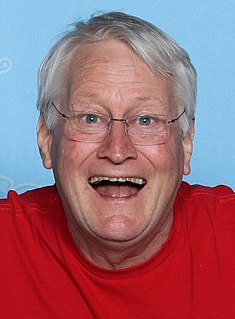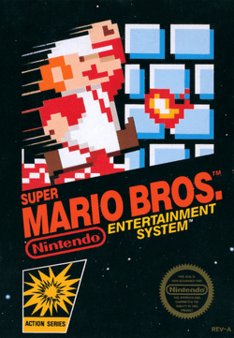Mario David may refer to:
Mario David may refer to:
Mario Kart is a series of racing games developed and published by Nintendo. Players compete in go-kart races while using various power-up items. It features characters and courses from the Mario series as well as other gaming franchises such as The Legend of Zelda, Animal Crossing, F-Zero and Splatoon.

Shigeru Miyamoto is a Japanese video game designer, producer and game director at Nintendo, where he serves as one of its representative directors. Widely regarded as one of the most accomplished and influential designers in the history of video games, he is the creator of some of the most acclaimed and best-selling game franchises of all time, including Mario,The Legend of Zelda, Donkey Kong, Star Fox and Pikmin.

Mario Bros. is a 1983 arcade game developed and published for arcades by Nintendo. It was designed by Shigeru Miyamoto and Gunpei Yokoi, Nintendo's chief engineer. Italian twin brother plumbers Mario and Luigi exterminate creatures emerging from the sewers by knocking them upside-down and kicking them away. The Famicom/Nintendo Entertainment System version is the first game produced by Intelligent Systems. It is part of the Mario franchise, but originally began as a spin-off from the Donkey Kong series.

Super Mario Bros. 3 is a platform game developed and published by Nintendo for the Nintendo Entertainment System (NES). It was released for home consoles in Japan on October 23, 1988, in North America on February 12, 1990 and in Europe on August 29, 1991. It was developed by Nintendo Entertainment Analysis and Development, led by Shigeru Miyamoto and Takashi Tezuka.

Mario is a character created by Japanese video game designer Shigeru Miyamoto. He is the title character of the Mario franchise and the mascot of Japanese video game company Nintendo. Mario has appeared in over 200 video games since his creation. Depicted as a short, pudgy, Italian plumber who resides in the Mushroom Kingdom, his adventures generally center on rescuing Princess Peach from the Koopa villain Bowser. Mario has access to a variety of power-ups that give him different abilities. Mario's fraternal twin brother is Luigi.

Bowser, or King Koopa, is a fictional character, the primary antagonist in Nintendo's Mario franchise, and the arch-nemesis of Mario. In Japan, the character bears the title of Daimaō. Bowser is the leader of the turtle-like Koopa race. Despite the fact that Bowser has teamed up with Mario in a few games, his ultimate goals are to kidnap Princess Peach and to defeat Mario and Luigi to conquer the Mushroom Kingdom. Bowser's defining traits are his monstrous appearance with dragon-like elements, full-throated roar, fire-breathing abilities, cruel personality, bestial reptilian voice, never-ending conflict with Mario, and unrequited crush for Peach.

Super Mario 64 is a 1996 platform game for the Nintendo 64. Developed by Nintendo Entertainment Analysis and Development and published by Nintendo, it is the first Super Mario game to feature 3D gameplay, combining traditional Super Mario gameplay, visual style, and characters in a large open world. Bowser, one of the main antagonists of the Super Mario franchise, invades Princess Peach's castle and hides the castle's sources of protection, Power Stars, in many different worlds behind magical paintings. As Mario, the player collects Power Stars to unlock enough of Princess Peach's castle to get to Bowser and rescue Princess Peach.

Super Mario Bros. is a 1993 adventure comedy film based on Nintendo's Super Mario video game series. The first feature-length live-action film based on a video game, it was directed by the husband-and-wife team of Rocky Morton and Annabel Jankel, written by Parker Bennett, Terry Runté, and Ed Solomon, and distributed by Buena Vista Pictures through Hollywood Pictures. It follows brothers Mario and Luigi in their quest to rescue Princess Daisy from a dystopic parallel universe ruled by the ruthless King Koopa.

Mario Francesco Batali is an American chef, writer, and restaurateur. Batali co-owned restaurants in New York City; Las Vegas; Los Angeles; and Newport Beach, California; Boston; Singapore; Westport, Connecticut; and New Haven, Connecticut. Batali has appeared on the Food Network, on shows such as Molto Mario and Iron Chef America, on which he was one of the featured "Iron Chefs". In 2017, the restaurant review site Eater revealed multiple accusations of sexual misconduct against Batali and, in March 2019, he sold all his restaurant holdings.

The Mario franchise is a video game series by Nintendo. While Nintendo is usually the developer and publisher of games in the franchise, various series are developed by third-party companies, such as Hudson Soft and Intelligent Systems. Games in the Mario Franchise primarily revolve around Super Mario, and often involve the trope of Bowser kidnapping Princess Peach, with Mario then rescuing her. Many characters have goals or plot arcs that vary from series to series; for example, the Luigi's Mansion games focus on Luigi ridding his newly purchased mansion of ghosts, while Wario stars in games that center around his greed and desire for money and treasure.

Charles Martinet is an American actor and voice actor, known for his portrayal of both Mario and Luigi in the Super Mario video game series since 1992. He is also the voice of other characters in the series such as Wario and Waluigi.

Mario Dewar Barrett, known mononymously as Mario, is an American singer, songwriter, actor, dancer, and model. Born and raised in Baltimore, Maryland, he signed a record deal with J Records at the age of fourteen, and recorded his eponymous debut album released in 2002. It includes the top 10 single, "Just a Friend 2002". His second album Turning Point, was released in 2004, and produced the number one single "Let Me Love You", which won him two Billboard Music Awards. His third studio album Go was released in December 2007, and included the singles "How Do I Breathe", "Crying Out for Me" and "Music for Love". His fourth studio album D.N.A. was released in 2009, and included the singles "Break Up" and "Thinkin' About You". At the end of the 2000s decade, Mario was ranked No. 98 by Billboard on their "Artist of the Decade" list. His fifth album Dancing Shadows, released in 2018, saw him in a more introspective sound than previous albums.

"Let Me Love You" is a song by American singer Mario, released as a single on October 4, 2004, from his second studio album, Turning Point (2004). The song was written by Ne-Yo, Kameron Houff and Scott Storch, and produced by Storch. The remix of the song, also produced by Storch, contains rapped verses from Jadakiss and T.I. The song garnered Mario a Grammy Award nomination for Best Male R&B Vocal Performance in 2006 and became a top-10 hit worldwide, reaching number one in the United States, Canada, Germany, the Netherlands, and New Zealand.
Camp MTV was a 6-hour special produced by MTV that aired on that channel Sunday, July 30, 1989. MTV’s then-current personalities invaded Camp Scatico, a brother-sister sleep-away camp in Columbia County of New York state. During the special, the film UHF, which was about to be released by Orion Pictures, was promoted. It was the brainchild of executive Doug Herzog, who was the vice president of programming at the time. Scatico was chosen because Herzog attended the camp during the 1970s.

Rosalina, known as Rosetta in Japan (ロゼッタ), is a fictional character in the Mario series of video games. She debuts in Super Mario Galaxy, where she acts as a non-player character who resides in the Comet Observatory, the game's hub world. Rosalina is the adoptive mother of Lumas, a fictional species of stars in the game, and also watcher of the cosmos. Rosalina has since appeared as a player character in subsequent Mario games, such as the Mario Kart, Mario Golf, Mario Party, and the Super Smash Bros. series.
A YouTube Poop (YTP) is a type of video mashup or edit created by remixing/editing pre-existing media sources often carrying subcultural significance into a new video for humorous, satirical, obscene, and profane—as well as annoying, confusing, or dramatic—purposes. YouTube Poops are traditionally uploaded to the video sharing website YouTube, hence the name.
Ferreiro is a surname of Galician origin, equivalent to English Smith. Notable people with the surname include:

Super Mario Bros. is a platform game developed and published by Nintendo. The successor to the 1983 arcade game Mario Bros. and the first in the Super Mario series, it was released in 1985 for the Famicom in Japan. Following a limited US release for the Nintendo Entertainment System (NES), it was ported to international arcades for the Nintendo Vs. System in early 1986. The NES version received a wide release in North America that year and in PAL regions in 1987.
Balleri is an Italian surname. Notable people with the surname include: